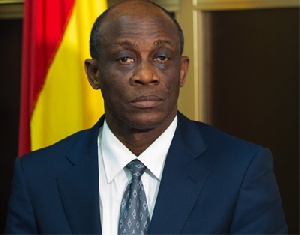Mr Seth Terkper, Minister of Finance has cautioned that subsidies on utilities could cripple the country’s budget, if allowed to exceed unreasonable limit.
He indicated that higher subsidies on utilities and petroleum are among major factors that caused the 2012 fiscal slippage.
“Inasmuch as utilities and subsidies are important, we should make sure that they are not excessive because they bring the budget to its knees as we saw in 2012,” he stressed.
Mr Terkper said this in response to a question on payment of utilities by tertiary institutions, when he delivered a public lecture on “Challenges and experiences of managing the economy of Ghana”, at the University of Cape Coast (UCC), his alma mater.
He disclosed that Government spent more than GH? 30million on utilities for only the nine public universities.
He expressed the need for tertiary institutions to consider adopting unconventional sources of electricity such as biogas and solar, use of prepaid meters as well as conserve energy and check illegal use of electricity.
Government has withdrawn payment of utilities for ministries, department and agencies while engaging in a nationwide debate as to whether the state would make tertiary students resident in halls, pay utility bills
Mr Terkper listed other causes of the 2012 fiscal slippage to include high wages and wage arrears payment under the Single Spine Salary Structure and high interest cost burden arising from steep rise in short term domestic interest rates.
Other factors, he said included higher spending on goods and services and shortfalls in corporate income taxes from petroleum sector and shortfalls in grants due to inadequate disbursement from development partners.
He said the implementation of a number of measures in the 2013 and 2014 budgets as well as home grown policy had resulted in the significant progress in areas such as the wage bill, clearance of wage related arrears and removal of subsidies on petroleum and utility tariffs.
He stated that corporate income tax from oil companies has significantly turned positive while shortfall in corporate income receipts in the petroleum sector has been reversed.
Mr Terkper said given Government’s commitment to fiscal consolidation, the economy has a very bright medium term prospect supported by an expanded services sector, the discovery of more oil and gas fields and the coming on stream of the country’s own gas processing plant.
He said growth is therefore expected to pick up over the medium term to 9.2 per cent with inflation reducing to 8.2 per cent by 2017 from 15.60 per cent as of March 2015, while fiscal accounts would be reduced to 3. 7 per cent and current deficits 4.9 per cent.
Responding to a question on corruption, he said people would exploit weak systems and procedures so long as they remain weak, and expressed the need for effective human resource management system in the public service to check corruption.
Professor Domwini Dabire Kuupole, Vice Chancellor of the UCC, who presided over the lecture, expressed the need for the state to conserve energy and collaborative efforts in solving the energy crisis to put the country on a better pedestal for posterity.
Business News of Saturday, 9 May 2015
Source: GNA













